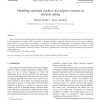Free Online Productivity Tools
i2Speak
i2Symbol
i2OCR
iTex2Img
iWeb2Print
iWeb2Shot
i2Type
iPdf2Split
iPdf2Merge
i2Bopomofo
i2Arabic
i2Style
i2Image
i2PDF
iLatex2Rtf
Sci2ools
DSS
2007
2007
Modelling uncertain positive and negative reasons in decision aiding
The use of positive and negative reasons in inference and decision aiding is a recurrent issue of investigation as far as the type of formal language to use within a DSS is concerned. A language enabling to explicitly take into account such reasons is Belnap's logic and the four valued logics derived from it. In this paper, we explore the interpretation of a continuous extension of a four valued logic as a necessity degree (in possibility theory). It turns out that, in order to take full advantage of the four values, we have to consider “sub-normalised” necessity measures. Under such a hypothesis four valued logics become the natural logical frame for such an approach. © 2006 Elsevier B.V. All rights reserved.
Related Content
| Added | 13 Dec 2010 |
| Updated | 13 Dec 2010 |
| Type | Journal |
| Year | 2007 |
| Where | DSS |
| Authors | Meltem Öztürk, Alexis Tsoukiàs |
Comments (0)

